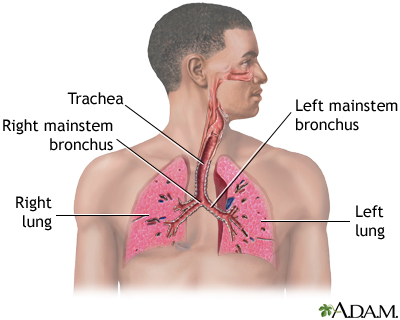Solitary fibrous tumor
Mesothelioma - benign; Mesothelioma - fibrous; Pleural fibroma
Solitary fibrous tumor (SFT) is a noncancerous tumor of the lining of the lung and chest cavity, an area called the pleura. SFT used to be called localized fibrous mesothelioma.
Images

Causes
The exact cause of SFT remains unknown. This type of tumor affects men and women equally.
Symptoms
About one half of the people with this type of tumor do not show any symptoms.
If the tumor grows to a large size and pushes on the lung, it can lead to symptoms, such as:
- Chest pain
- Chronic cough
- Shortness of breath
- Clubbed appearance of the fingers
Exams and Tests
SFT is usually found by accident when a chest x-ray is done for other reasons. If the health care provider suspects SFT, tests will be ordered. These may include:
The diagnosis of SFT is difficult compared with the cancerous type of this disease, called malignant mesothelioma, which is caused by exposure to asbestos (as cancer needs to be ruled out). SFT is not caused by asbestos exposure.
Treatment
SFT is usually treated by removing the tumor.
Outlook (Prognosis)
The outcome is expected to be good with prompt treatment. In rare cases, the tumor may return.
Possible Complications
Fluid escaping into the membranes around the lungs (pleural effusion) is a complication.
When to Contact a Medical Professional
Contact your provider for an appointment if you notice symptoms of SFT.
Related Information
TumorBreathing difficulty
Pleural effusion
References
Kaidar-Person O, Zagar T, Haithcock BE, Weiss, J. Diseases of the pleura and mediastinum. In: Niederhuber JE, Armitage JO, Kastan MB, Doroshow JH, Tepper JE, eds. Abeloff's Clinical Oncology. 6th ed. Philadelphia, PA: Elsevier; 2020:chap 70.
Konopka K, Arenberg DA. Benign lung tumors. In: Broaddus VC, Ernst JD, King Jr TE, et al, eds. Murray and Nadel's Textbook of Respiratory Medicine. 7th ed. Philadelphia, PA: Elsevier; 2022:chap 80.
BACK TO TOPReview Date: 7/31/2022
Reviewed By: Denis Hadjiliadis, MD, MHS, Paul F. Harron, Jr. Professor of Medicine, Pulmonary, Allergy, and Critical Care, Perelman School of Medicine, University of Pennsylvania, Philadelphia, PA. Also reviewed by David C. Dugdale, MD, Medical Director, Brenda Conaway, Editorial Director, and the A.D.A.M. Editorial team.

Health Content Provider
06/01/2025
|
A.D.A.M., Inc. is accredited by URAC, for Health Content Provider (www.urac.org). URAC's accreditation program is an independent audit to verify that A.D.A.M. follows rigorous standards of quality and accountability. A.D.A.M. is among the first to achieve this important distinction for online health information and services. Learn more about A.D.A.M.'s editorial policy, editorial process and privacy policy. A.D.A.M. is also a founding member of Hi-Ethics. This site complied with the HONcode standard for trustworthy health information from 1995 to 2022, after which HON (Health On the Net, a not-for-profit organization that promoted transparent and reliable health information online) was discontinued. |
The information provided herein should not be used during any medical emergency or for the diagnosis or treatment of any medical condition. A licensed medical professional should be consulted for diagnosis and treatment of any and all medical conditions. Links to other sites are provided for information only -- they do not constitute endorsements of those other sites. © 1997- 2024 A.D.A.M., a business unit of Ebix, Inc. Any duplication or distribution of the information contained herein is strictly prohibited.
